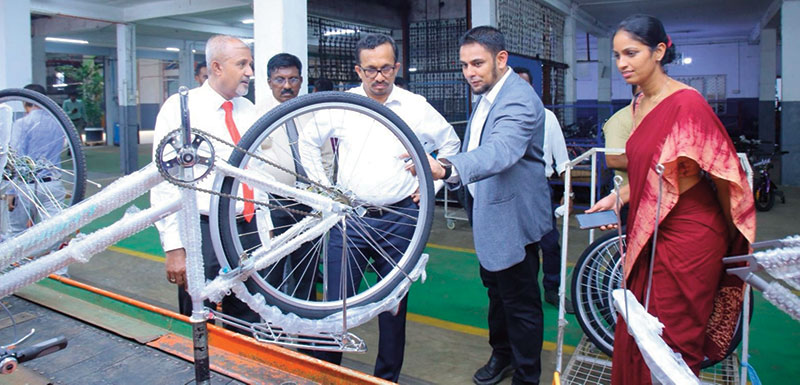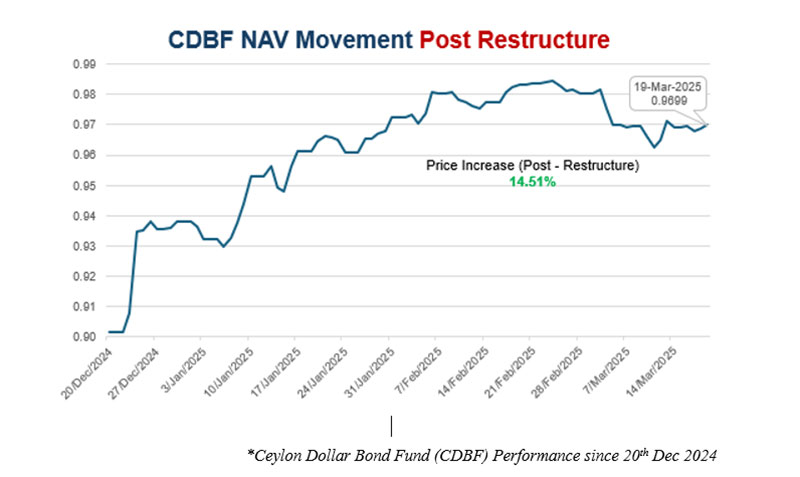Business
SL’s Rs. 2.4 trillion fiscal deficit and the need for ‘incremental, transformative adjustments’

By Ifham Nizam
Sri Lanka has long grappled with economic instability and the Rs 2.4 trillion fiscal deficit remains a daunting challenge for the newly elected National Peoples’ Power (NPP) government, Dr. Rohan Pethiyagoda, a taxonomist and a former senior state official said. Among other things, he is a major contributor to biodiversity research in Sri Lanka.
‘Despite promises of change, bridging this gap requires more than just increased taxation or large-scale reforms. Dr. Pethiyagoda, told The Island Financial Review. He said the way forward is through incremental but transformative adjustments that prioritize efficiency, accountability and governance reform.
Pethiyagoda added: ‘One of the most pressing issues facing the new government is the staggering deficit that no amount of taxation can cover. Even a doubling of taxes will not be sufficient to resolve this economic challenge. Instead, adopting a more conservative approach to economic management—a “conservative batting style”—where efficiency and cost-cutting take precedence over flashy reforms or quick fixes is appropriate.
‘This approach calls for a fundamental shift in how the government operates. It begins by reducing wasteful expenditures, streamlining public services and improving institutional efficiency. References could be made to the success of past efforts to meet government targets in areas like public services, which provide a roadmap for future reforms.
‘To tackle the deficit and improve public service delivery, the government needs to set clear and measurable goals for each institution. The government has already succeeded in meeting targets, such as issuing same-day (4-hour) passports, NICs, driving licenses and EPF releases. These successes demonstrate that, with the right focus, government institutions can be made to function with greater efficiency.
‘Other potential areas for reform include reducing waiting time for essential documents, such as birth, death and marriage certificates, to 30 minutes. Additionally, regulatory institutions should be held accountable for issuing permits, licences and registrations within strict timeframes. The government could publicly advertise these mandatory response times, making the process transparent and creating consequences for institutions or heads that fail to meet these goals.
‘The strategy of improving public services extends to everyday interactions between citizens and the state. Reducing queuing times in hospitals, post offices and other public facilities is another straightforward yet impactful change. By increasing the speed and efficiency of these services, the government can drastically improve the daily lives of citizens, boosting public trust and satisfaction.
‘A critical element in building a more efficient society is improving public discipline. This does not only apply to government institutions but to society at large. Public behavior on the roads and in service queues is a reflection of the country’s broader efficiency issues. Addressing simple matters, like better driving practices and the formation of orderly lines in public spaces, would contribute to an overall culture of discipline and respect for rules.
‘Small improvements in how people interact with government services and each other can set the tone for broader societal changes. My argument is that these incremental improvements in public discipline will, over time, create a more functional and efficient society.
‘It’s clear that Sri Lanka cannot solve its economic problems overnight, but by focusing on small, tangible improvements, the government can create a momentum for lasting change. Reducing public holidays, improving the speed of essential services and holding institutions accountable are the building blocks of a more efficient, transparent, and disciplined society.
‘Do these things, and the rest will follow. These incremental changes might seem minor, but they will make a significant difference over time, helping Sri Lanka move towards economic recovery and societal improvement.
‘The path to reform is not through sweeping changes or aggressive policies, but through consistent, small steps that prioritize efficiency, discipline, and accountability. By focusing on these goals, the government can begin to close the fiscal gap and build a brighter future for Sri Lanka.’
Business
Industry and Entrepreneurship Development Minister Handunneththi’s visit to Lumala highlights key industrial concerns

With the aim of assesing the current challenges faced by local industrialists and explore avenues for government support, Minister of Industry and Entrepreneurship Development Hon. Sunil Handunneththi visited City Cycle Industries Manufacturing (Pvt.) Ltd., widely known as Lumala, on March 24 at its factory in Panadura.
During the visit, Minister Handunneththi engaged with senior officials and employees to understand their concerns and operational difficulties. In a statement shared on social media, the Minister acknowledged the pressing challenges affecting Sri Lanka’s manufacturing sector and emphasized the government’s commitment to providing swift and effective solutions.
Minister Handunneththi further reiterated the government’s intent to position local manufacturers as key stakeholders in Sri Lanka’s economy by addressing regulatory hurdles, market imbalances, and supply chain constraints.
The visit comes amid growing concerns from Lumala employees and management regarding the state of Sri Lanka’s bicycle manufacturing industry, in the backdrop of facing significant challenges, including an influx of imported bicycles and components that circumvent regulatory checks. In addition, the high taxes on raw materials used in local manufacturing has further exacerbated production costs, making it difficult for domestic manufacturers to remain competitive.
Earlier this year, Lumala employees called for urgent government intervention to address these challenges, warning that ongoing financial strain could lead to further shutdowns of critical production units, job losses, and setbacks to the broader industrial ecosystem. With a local value addition of 50-70 percent verified by the Ministry, its workforce remains hopeful that government action will help achieve an ethical manufacturing industry.
Lumala, a household name in Sri Lanka’s bicycle industry, has been a key player in sustainable mobility solutions for over 35 years. The company was recently honored with the Best National Industry Brand award under the Large-Scale Other Industry Sector category at the National Industry Brand Excellence Awards 2024.
With a production capacity of 2,000 bicycles per day and a workforce of 200, Lumala continues to cater to both domestic and international markets, producing a diverse range of bicycles, electric bikes and light electric vehicles. In line with Sri Lanka’s goal to expand forest cover to 32 percent by 2030 and cut GHG emissions by 14.5%, Lumala is actively contributing to this mission—both as a company and through its diverse range of products.
As Sri Lanka works towards strengthening its local manufacturing sector, Minister Handunneththi’s visit signals a crucial step toward addressing industrial concerns and reinforcing government support for sustainable and competitive domestic production.
Business
New SL Sovereign Bonds win foreign investor confidence

Sri Lanka’s country rating was upgraded from ‘Restricted Default’ to ‘CCC’ following the successful exchange for the new International Sovreign Bonds (SL ISBs) during December 2024. The three types (03) of exciting new sovereign bonds have restored foreign investor confidence.
The Central Bank of Sri Lanka (CBSL) has performed a remarkable role in guiding the economy out of default status and restored economic stability, and gained Sri Lanka a non-default Country Rating of ‘CCC’. Among the key achievements of CBSL, have been to reduce treasury interest rates under 9% and stabilize the currency while rebuilding foreign reserves to $ 6Bn.
SL offers four Macro Linked Bonds (MLBs) linked to GDP growth, a Governance Linked Bond (GLB) and a short term, Fixed Coupon Bond for unpaid Past Due Interest (PDI). The MLBs offer variable returns depending on SL’s GDP growth from 2024 to 2027, (e.g. haircuts can vary between 16% to 39%). The GLB interest can vary depending on meeting 15.3% and 15.4% of Total Revenue/ GDP thresholds in 2026 and 2027 respectively. The PDI bond offers a fixed coupon of 4% until 2028 and trades at around $94.
This combination of unique, variable returns offers global investors an exciting opportunity to capitalize on SL’s economic revival and US interest rate movements. Sri Lanka’s economic resurgence in 2024 was promising, with a 5% GDP growth rate. With improving investor confidence, SL ISB daily turnover now exceeds $10mn.
The Ceylon Dollar Bond Fund (CDBF) is the only USD Sovereign Bond Fund that is exclusively invested in SL ISBs with Deutsche Bank acting as the Trustee and Custodian Bank. The Fund reported returns of 53% in 2023 and 39% in 2024.
We invite foreign investors to enter CDBF while Sri Lanka is rated at ‘CCC’ and consider realizing their investment upon SL reaching a Country Rating of ‘B- ‘. Other advantages of CDBF are, the ability to withdraw anytime and being tax exempted.
Ceylon Asset Management (CAM), the Fund Manager, has commenced an advertising campaign to promote the CDBF to the Sri Lankan Diaspora, South Asian, Middle Eastern and Australian Investors. CAM is an Associate Company of Sri Lanka Insurance Corporation (SLIC) and licensed under the Securities and Exchange Commission of Sri Lanka Act, No. 19 of 2021.
Meanwhile, the Ceylon Financial Sector Fund managed by CAM emerged as the top performing rupee fund in Sri Lanka during 2024, with a return of 64%. Investors can find out more on www.ceylonassetmanagement.com or write to us on info@ceylonam.com.
Past performance is not an indicator of the future performance. Investors are advised to read and understand the contents of the KIID on www.ceylonam.com before investing. Among others investors shall consider the fees and charges involved.(CAM)
Business
Share market plunges steeply for second consecutive day in reaction to US tariffs

CSE plunged at open, falling for the second consecutive day yesterday, down over 300 points in mid- morning trade.US President Donald Trump has imposed a 44 percent tax on Sri Lanka’s exports in an executive order which he claimed, spelt out discounted reciprocal rates for about half the taxes and barriers imposed by the island on America.
As a result both indices showed a downward trend. The All Share Price Index dropped 300 points, or 2.32 percent, to 15,294.94, while the S&P SL20 dropped 101 points, or 2.71 percent, to 4,517.37.
Turnover stood at Rs 3.1 billion with six crossings. Those crossings were reported in Sampath Bank which crossed 1.6 million shares to the tune of Rs 181 million and its shares traded at 109, JKH 4.1 million shares crossed to the tune of 80.5 million and its shares sold at Rs 19.5.
Hemas Holdings 400,000 shares crossed for Rs 45.6 million; its shares traded at Rs 114, CTC 25000 shares crossed to the tune of Rs 32.2 million; its shares traded at Rs 1330, Commercial Bank 200,000 shares crossed for 27 million; its shares traded at Rs 135 and TJ Lanka 157,000 shares crossed for Rs 20 million; its shares traded at Rs 46.
In the retail market top six companies that have mainly contributed to the turnover were; Sampath Bank Rs 296 million (2.9 million shares traded), JKH Rs 220 million (11.2 million shares traded), Haylays Rs 195 million (142,000 shares traded), HNB Rs 151 million (519,000 shares traded), Commercial Bank Rs 138 million (1 million shares traded) and Central Finance Rs 129 million (735,000 shares traded). During the day 218 million shares volumes changed hands in 22000 transactions.
It is said the banking sector was the main contributor to the turnover, especially Sampath Bank, while manufacturing sector, especially JKH, was the second largest contributor.
Yesterday, the rupee opened at Rs 296.75/90 to the US dollar in the spot market, stronger from Rs 296.90/297.20 on the previous day, dealers said, while bond yields were up.
A bond maturing on 15.10.2028 was quoted at 10.35/40 percent, up from 10.25/30 percent.
A bond maturing on 15.09.2029 was quoted at 10.50/60 percent, up from 10.45/55 percent.
A bond maturing on 15.10.2030 was quoted at 10.60/70 percent, up from 10.30/65 percent.
By Hiran H Senewiratne
-

 Business1 day ago
Business1 day agoStrengthening SDG integration into provincial planning and development process
-

 News5 days ago
News5 days agoBid to include genocide allegation against Sri Lanka in Canada’s school curriculum thwarted
-

 Sports6 days ago
Sports6 days agoSri Lanka’s eternal search for the elusive all-rounder
-

 Sports2 days ago
Sports2 days agoTo play or not to play is Richmond’s decision
-

 Business11 hours ago
Business11 hours agoNew SL Sovereign Bonds win foreign investor confidence
-

 News6 days ago
News6 days agoComBank crowned Global Finance Best SME Bank in Sri Lanka for 3rd successive year
-

 Features6 days ago
Features6 days agoSanctions by The Unpunished
-

 Features6 days ago
Features6 days agoMore parliamentary giants I was privileged to know











